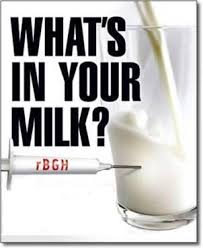Trade Your Milk and Butter for Plant-Based Versions
By, Kathy Freston
Health and Wellness Activist and Author
Provided by: http://www.kathyfreston.com/
Today we’re going to switch up milk and butter for their nondairy counterparts. And I’m going to point you to the yummiest ones.
Why this switch? Well, for starters, a lot of milk has added hormones in it — and these additives are no good for our waistlines. In fact, they’re not good for the cows that produce the milk, let alone the humans who drink it! These hormones are injected into cows to make them produce more milk (which creates more profit). But even organic, grass-fed, and chemical-free milk is full of naturally-occurring cow hormones that aren’t necessarily good for people, whether the milk is whole, 2 percent, or skim.
Think of how milk happens: It’s created by a lactating cow in order to feed her little calf so it will get really big, really quickly. By nature’s brilliant design, this milk contains naturally-occurring growth hormones in order to make a little one grow.
But we don’t want to be fat, docile, and slow like cows. No sir. We want to be slim and quick on our feet. By the time we are in kindergarten, we’re not drinking our mama’s milk to make us bigger anymore, and we definitely don’t need it from a cow, whose milk is designed to put a hefty 1,000 pounds on her baby!
Cow’s milk is the perfect nutrition for building a calf into a cow, but definitely not for a human — especially a human who would like to be slim. And to go even further, casein — the main protein in milk — is serious trouble for the human body. Casein is good for a nursing calf, because it helps her grow fast, and it’s designed by nature to keep her bonded to mama. But when humans take in casein from the cow… oh, not good.
The casein in dairy is downright addictive. During the process of dairy digestion, the casein breaks apart into a host of opioids called casomorphins. Note the “morphin(e)” in there? Well, sure enough, when you ingest dairy, you get sort of addicted, as you might to morphine. Why so? Because nature designed cow’s milk to have a drug-like effect on the calf’s brain, to ensure that the little one stays bonded to the mom. It’s nature’s way of making sure the little one continues to get all the nutrients he or she needs. And by the way, just as opiates tend to be constipating, so can dairy products constipate you (especially cheese). So just know it’s not for nothing that people say they are addicted to dairy — there’s a reason! But that’s why we are switching you to something better in such a way that you’ll hardly miss a beat.
Let’s get back to the nutritional issues. Might I mention that most of the fat in milk is saturated butterfat, which clogs your arteries and is bad for your heart? And according to T. Colin Campbell, professor emeritus of nutritional biochemistry at Cornell University and author of the groundbreaking book The China Study, that casein we were just talking about actually promotes cancer. In fact, he says casein is one of the most significant cancer promoters ever discovered. In layperson’s terms: Milk protein can fertilize cancer cells. (You can read more on this in my book Veganist.)
Trade your milk for nondairy versions and your stomach is likely to settle down real quickly. Not only that, the pounds will drop, too.
Putting the problem of casein aside for a moment, let’s talk about skim milk.
In a fascinating twist on expectation, a 2011 Harvard study of 12,829 children showed that skim milk may make you fatter than whole milk. That wouldn’t surprise farmers; when they want to fatten up a pig, they feed it skim milk.
The reason? Milk sugar.
When you remove the fat from milk, what’s left is lactose — milk sugar. The end product is an unbalanced, sugary-like drink that leads to weight gain.
So skip the nonfat and low-fat stuff and go for a yummy nondairy milk instead — preferably one that is unsweetened (although there are some nondairy milks that are sweetened with stevia; more on stevia in a couple of days).
I prefer the unsweetened nondairy milks so I can sweeten them, if I need to, to my own taste. Usually all it takes is a smidge of agave or stevia, but it’s always better to see how much sugary stuff you’re using and try to cool it wherever possible.
These days there are so many wonderful milk alternatives. You can find soy, almond, rice, hemp, or coconut milk just about anywhere, even at your favorite coffee place.
You’ll feel extra good about making this switch when I tell you that the USDA and the Department of Health and Human Services just released their Dietary Guidelines for Americans in January 2011, in which they provide advice on how good dietary habits can promote health and reduce risk for major chronic diseases. The guidelines emphasize a plant-based diet! Most people think that plant-based foods are just fruits and vegetables, but they include whole grains, nuts, legumes, and soy foods like soy milk, almond milk, and coconut milk.
Plant-based foods are associated with lower rates of heart disease, stroke, and diabetes because they tend to be high in nutrients and low in calories and saturated fat. Research has also shown that plant-based foods can help reduce the risk of chronic disease. For example, most plant-based foods are much lower in saturated fat than animal foods, making them a better choice for maintaining heart health. Also, since plant-based foods contain no cholesterol, using them to replace animal foods can be an effective way to lower overall cholesterol intake.
One “nutrient of concern” noted by the new Dietary Guidelines is calcium. Since consumers do not get enough of this vital nutrient, many makers of soy, almond, and coconut milks have recently increased the calcium level in their products to equal that of conventional dairy milk, or they even surpass it by 50 percent! Fifty percent more calcium than milk — well, you can’t beat that!
Butter
Now to everyone’s favorite fat: butter. Butter makes everything taste better. Okay, agreed. But butter is nearly all fat — much of it saturated fat — and it’s calorie-dense. One tablespoon of butter has 102 calories. Compare that to hummus, which has only 25 calories for the same tablespoon. If you’re looking for a spread for your toast or cracker, try using hummus or some other bean spread. You can even smear a little avocado where you would have used butter. If you are sautéing something, try using a little spray olive oil, and when I say a little, I mean like a super-quick spritz.
And if you consider the taste of butter an absolute must-have every once in a while, try Earth Balance buttery spread. It’s delicious and substitutes perfectly anywhere you’d use butter.
If you’ve heard nasty things about margarine — and they’re likely true — don’t worry: Earth Balance is not margarine.
What to Do Today:
– Eat a Hearty Breakfast
– Make Your Lunch Without Animal Products
– Eat a Super Food
– Trade Up the Milk and Butter
What You’ll Need for Tomorrow:
Ground Flax seed (you can buy it whole and grind it yourself in a coffee grinder or you can buy it already ground.)


